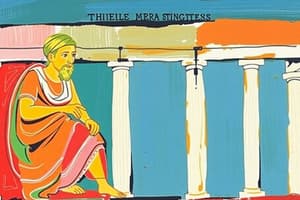Podcast
Questions and Answers
Why were the conclusions of early Greek philosophers, like Thales of Miletus, often inaccurate concerning the nature of the cosmos?
Why were the conclusions of early Greek philosophers, like Thales of Miletus, often inaccurate concerning the nature of the cosmos?
- They lacked access to advanced mathematical tools necessary for calculating cosmic distances and movements.
- They were overly reliant on religious and mythological explanations, hindering objective analysis.
- Their philosophical method depended largely on observational deduction without experimental validation. (correct)
- Their knowledge was limited by geographical constraints, preventing them from observing diverse natural phenomena.
What distinguished Alhazen's approach to the study of optics from earlier methods?
What distinguished Alhazen's approach to the study of optics from earlier methods?
- His focus on the psychological aspects of perception rather than the physical properties of light.
- His employment of systematic experiments, such as dissecting bulls' eyes, to gain empirical data. (correct)
- His use of complex mathematical models to predict the behavior of light.
- His reliance on theological interpretations to understand vision.
How did the establishment of the House of Wisdom in Baghdad contribute to the progression of science?
How did the establishment of the House of Wisdom in Baghdad contribute to the progression of science?
- It facilitated the translation and preservation of key texts from Greece and India, nurturing scholarly activity. (correct)
- It directly oversaw international scientific collaborations in the Western world.
- It provided funding for ambitious architectural projects that symbolized scientific advancement.
- It enforced strict scientific doctrines, ensuring adherence to established knowledge.
Why is the ability to revise previously held truths considered a mark of a true scientist?
Why is the ability to revise previously held truths considered a mark of a true scientist?
How did Galileo Galilei challenge prevailing scientific thought in 1590?
How did Galileo Galilei challenge prevailing scientific thought in 1590?
What differentiates the scientific method from the philosophical methods used by early thinkers like Aristotle?
What differentiates the scientific method from the philosophical methods used by early thinkers like Aristotle?
What implications arise from the understanding that science is a continually evolving process?
What implications arise from the understanding that science is a continually evolving process?
How did Islamic scholars, such as al-Khwarizmi, significantly influence the advancement of scientific knowledge?
How did Islamic scholars, such as al-Khwarizmi, significantly influence the advancement of scientific knowledge?
What role does skepticism play in scientific progress?
What role does skepticism play in scientific progress?
Which statement best explains the relationship between observation and experimentation in scientific discovery?
Which statement best explains the relationship between observation and experimentation in scientific discovery?
Flashcards
Science
Science
Humanity's continuous effort to understand the Universe through research, insight, and discovery.
Ancient Greek Philosophers
Ancient Greek Philosophers
Early philosophers who tried to explain the world through observation, although their methods lacked experimental evidence.
Thales of Miletus
Thales of Miletus
Proposed that water is the primary substance of the cosmos.
Aristotle's Scientific Contributions
Aristotle's Scientific Contributions
Signup and view all the flashcards
Zhang Heng
Zhang Heng
Signup and view all the flashcards
Islamic Scientific Golden Age
Islamic Scientific Golden Age
Signup and view all the flashcards
House of Wisdom
House of Wisdom
Signup and view all the flashcards
Al-Khwarizmi
Al-Khwarizmi
Signup and view all the flashcards
Alhazen
Alhazen
Signup and view all the flashcards
Galileo Galilei's Discovery
Galileo Galilei's Discovery
Signup and view all the flashcards
Study Notes
- Science is humanity's continuous effort to comprehend the Universe, involving research, insight, and discoveries, often leading to further questions.
- Humans have always sought to understand the world, with ancient Greek philosophers being the first to explain observations.
- Early philosophical methods lacked experimental evidence, leading to inaccuracies.
- Thales of Miletus (6th century BCE) believed water was the primary substance, recognizing its importance for life and presence in various forms.
- Aristotle wrote on science from physics to astronomy, but made errors such as heavier objects fall faster since he relied on argument instead of proof.
- Early thinkers made discoveries, like Halley's comet in China (240 BCE), and Zhang Heng, who explained eclipses and cataloged stars.
Scientific Dawn
- During the Middle Ages, science stalled in Europe; knowledge shifting to the Islamic world boosted scientific thinking.
- The House of Wisdom library in Baghdad (8th century CE) nurtured scholars by preserving important Greek and Indian writings.
- Key scholars included al-Khwarizmi (mathematics like trigonometry and algebra) and Alhazen (optics, studied dissected bulls' eyes, first scientific experiments).
Progression of Ideas
- True scientists can assess and revise truths.
- Scientists acknowledge that science evolves so work can be superseded.
- In 1590, Galileo Galilei disproved Aristotle's theory, stating objects fall at the same speed regardless of mass.
- Galileo supported Copernicus's heliocentric universe concept and was declared a heretic, also paving the way for our modern understanding of the Universe.
Studying That Suits You
Use AI to generate personalized quizzes and flashcards to suit your learning preferences.



